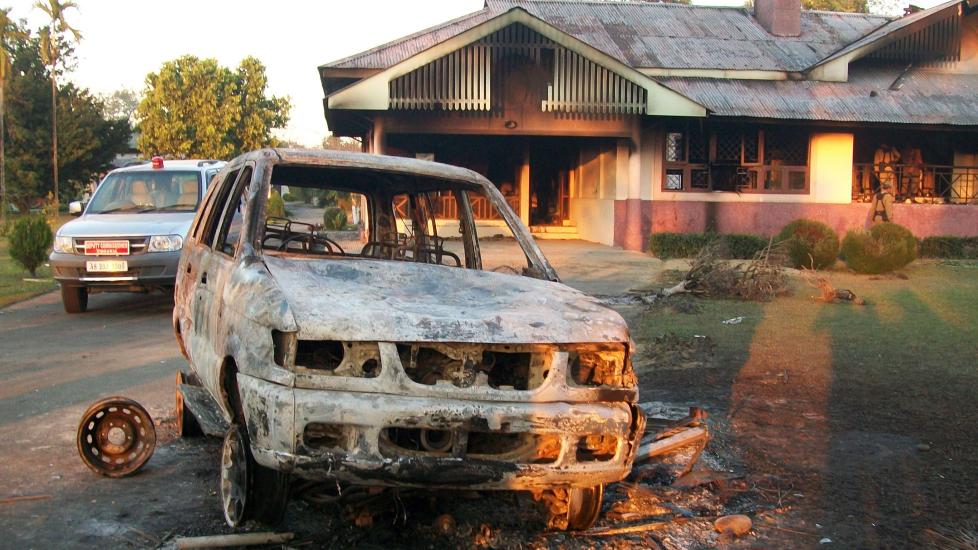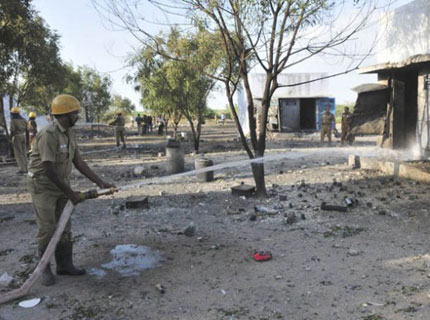INDE : DES OUVRIERS DU THÉ BRÛLENT LEUR PATRON
MONDE – Des travailleurs en colère ont incendié le domicile de leur patron. Ce dernier et son épouse ont trouvé la mort…

Des centaines de travailleurs dans des plantations de thé indiennes ont mis le feu au bungalow de leur patron dans le nord-est de l’Inde, révèle ce vendredi la BBC. Le propriétaire Mridul Kumar Bhattacharyya et son épouse Rita ont trouvé la mort dans l’incendie, ont confirmé les autorités locales. Les deux corps n’ont été découverts dans les décombres que plus tard. Les deux véhicules du couple ont également été détruits.
Un conflit de deux semaines
Les 700 ouvriers en colère, en conflit avec leur patron depuis deux semaines ont entouré son bungalow mercredi soir [26 décembre], à Kunapathar, dans l’état d’Assam. (…) D’après la police, leur hiérarchie aurait demandé à certains de quitter leur logement.
Trois personnes ont été arrêtées par les forces de l’ordre. (…)

Presse esclavagiste (20 Minutes, 28 décembre 2012) via Le Chat Noir Émeutier
(…) Une ouvrière de la plantation interrogée par une chaîne de télévision locale a déclaré que le patron « méritait d’être tué, car il nous exploitait depuis longtemps et nous torturait pour rien ».
Il y a deux ans M. Bhattacharyya a été confronté à une protestation d’ouvriers en colère dans une autre plantation. À l’époque, les ouvriers ont allumé un feu près de l’usine. Ils alléguaient que le patron avait tiré sur des ouvriers qui protestaient devant sa maison, l’accusant d’avoir agressé une femme.
De nombreux incidents ont eu lieu ces dernières années dans les plantations de thé dans l’État d’Assam. Les 800 plantations de thé de l’État d’Assam produisent 55 % du thé en Inde.
Presse esclavagiste (Radio Canada, 27 décembre 2012) via Solidarité ouvrière
INDIAN TEA WORKERS SET FIRE TO BOSS
Over 1,000 tea workers in the India state of Assam have gathered outside the home of the plantation owner as part on an on-going labour dispute. Following shots being fired from the plantation owner’s house, the workers set his house and cars alight. The plantation owner, Mridul Bhattacharya, has a history of exploiting and killing workers.

An unnamed female tea worker was quoted as saying that:
“We all came and attacked the bungalow and set it on fire. They deserved to be killed as the planter has exploited us for a long time and tortured us for petty things. »
A local newspaper reported that the violence was sparked by the plantation owner and exploiter Mridul Bhattacharya ordering 10 workers to leave their homes with immediate effect, and the detention of several workers by the police on unspecified charges. The workers claim that Bhattacharya had not paid them their wages that had been due in December, and all the other issues have stemmed from workers complaining about the non-payment.
When workers refused to leave their homes (owned by the plantation) he had them arrested and imprisoned. An unnamed worker said that:
“Some workers met Bhattacharya Wednesday morning and requested him to get the arrested labourers released. He, however, did not pay any heed to the request and threatened the workers of dire consequences. This angered the labourers and they took the extreme step.”
It is reported that Bhattacharya has been engaging in similar practices at his other plantations. Two years ago, during another Labour dispute, Bhattacharya opened fire on a crowd who were protesting an attack on a female worker at the plantation.
Another local newspaper described the incident involving Bhattacharya:
“Bhattacharya, who also owned the Rani Organic Tea Estate, some eight km from here, was booked for the murder of a 15-year-old youth in 2010. He was later released on bail in the murder case.
The 2010 incident took place when a group of villagers staged a protest in front of his house after he raised objections against the use of a road inside the Rani estate by the locals and harassed a woman. Bhattacharya opened fire at the protesters, in which the boy sustained bullet injuries and died.
Bhattacharya, a mechanical engineer by training, was from Tezpur. He had worked for many tea estates in Assam before winning a contract worth several million rupees for drilling and laying of pipelines in the state in the 1980s.”
The police are widely used to derail workers attempts to organise in India, particularly in rural areas, where police corruption is rife, and if you can provide a big fat brown envelope, the local inspector will be in your pocket.
The local police and private security have now been brought in to maintain order…… but more importantly, to ensure that there is no loss in tea production.
Assam produces around 55% of India’s annual tea production, which stood at 988.32 million kilograms (2,174.3 million pounds) last year, and the state is home to more than 800 tea estates.
Several other attacks on the bosses at tea plantations have been reported over the last couple of years, and similar incidents in other sectors are becoming more commonplace.
Working class self organisation / Libcom, 27 décembre 2012
(…) In May 2003, tea workers dragged deputy manager of Sapoi Tea estate in Sonitpur district Anthony D Unger and senior assistant manager Susmit Kumar Singh out of their homes and hacked them to death. Their bodies were burnt later.
On June 13 the same year, a senior assistant manager of Modarkhat Tea Estate in Dibrugarh, Mukul Dowerah was hacked to death by garden labourers in protest against the sacking of three workers on grounds of being absent from work without permission.
Again on September 29 that year, the manager of Khobang Tea Estate in Tinsukia district was dragged out of office by labourers demanding more bonus. But the manager was rescued by his personal security officers, who resorted to firing in defence, killing seven labourers in the process and injuring 20 others.
On February 11, 2005, 250 labourers beat up the managing director of Gobindupur Tea Estate in Golaghat district, Rupak Gogoi, and later burnt him following dispute over daily wages. Recently, the Golaghat district sessions court awarded life imprisonment to 13 labourers of the tea estate after holding them accused in the gruesome murder of Rupak. Gogoi was the son of former finance minister of the state, Jibakanta Gogoi, and the husband of Congress legislator from Khumtai, Bismita Gogoi.
Less than a month later on March 24, tea grower Digen Bora was hacked to death by workers of Dikahri Nepaligaon in Dibrugarh district.
On March 18, 2006, labourers of Sakumatu Tea Estate at Biswanath Chariali in Assam’s Sonitpur district beheaded five members of a family of their own tribe after accusing them of practising witchcraft and black magic.
Presse esclavagiste (TimesOfIndia.indiatimes.com, 28 décembre 2012)
